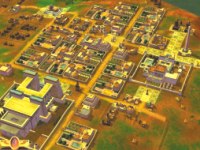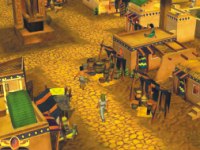
Reviewed
by Gokhra
 Have
you noticed that award winning movies aren't usually all that exciting
to watch? The Aviator won a multitude of awards and the same question
arises? Is it worth the anticipation?
Have
you noticed that award winning movies aren't usually all that exciting
to watch? The Aviator won a multitude of awards and the same question
arises? Is it worth the anticipation?
Its based on the
real life trials of Howard Hughesvisionary airplane tycoon, movie mogul,
insatiable woman-chaser and mad recluse of Las Vegas.
The
plot: The movie set around the 50's begins as a comedy. Howard Hughes
(DiCaprio) is a good-looking young man who loves flying, movies and
is obsessed with big bossoms. Also he has a lot more money than he knows
what to do with. He starts off directing a World War I aviation adventure
named "Hell's Angels," which was then the most expensive movie
ever made. The industry laughed at him, but he finished the movie and
it made money, and so did most of his other films. He also produced
Hollywood shockers "Scarface" (too much violence) and "The
Outlaw" (too much sex). The movie portrays his battles with censor
Joe Breen over such movies. There's a row over one of Hughes actresses
Jane Russell showing too much cleavage. Hughes brings his meteorology
 professor (Ian Holm) to
the censorship hearing, introduces him as a systems analyst, and has
him prove with calipers and mathematics that Russell displays no more
cleavage than a control group of five other actresses.
professor (Ian Holm) to
the censorship hearing, introduces him as a systems analyst, and has
him prove with calipers and mathematics that Russell displays no more
cleavage than a control group of five other actresses.
Then there's the
hard fought romance where he wins Holluywoods then leading lady the
young, untamed Katherine Hepburn (Cate Blanchett). She shrewdly sizes
up Hughes and is quick to be concerned about his eccentricities. Women
were his for the asking but he didn't go for the easy kill. Others included
Jean Harlow and Ava Gardner. The latter blew him off when he offered
gifts of jewelry with the words "I am not for sale!"
His attention moved
from movies to the airplanes in his films and he began designing and
building aircraft and eventually bought his own airline. Amazing what
you can d when you don't have to bother with formal education lasting
way too many years.
 Then
there's the part in his career with his round-the-world plane trip.
These high-soaring scenes end with the film's searing first climax (and
most extraordinary moment) that has his experimental plane crash in
Beverly Hills ripping through houses. He steps out alive but this is
where the movie turns dark.
Then
there's the part in his career with his round-the-world plane trip.
These high-soaring scenes end with the film's searing first climax (and
most extraordinary moment) that has his experimental plane crash in
Beverly Hills ripping through houses. He steps out alive but this is
where the movie turns dark.
By the end, darkness
is gathering around Hughes. He gets stuck on words and keeps repeating
them. He walks into a men's room and then is too phobic about germs
to touch the doorknob in order to leave; with all his power and wealth,
he has to lurk next to the door until someone else walks in, and he
can sneak through without touching anything. Things keep getting worse
and Hughes ends up being a lonely old man living out his last few days
in a room.
Howard
Hughes in his last two decades sealed himself away from the world. At
first he haunted a penthouse in Las Vegas, and then he moved to a bungalow
behind the Beverly Hills  Hotel.
He was the world's richest man, and with his billions bought himself
a room he never left.
Hotel.
He was the world's richest man, and with his billions bought himself
a room he never left.
Verdict: It's a
movie about a massively wealthy and powerful man who seemed trapped
in a teenage boy's fantasy world. The Aviator" wisely focuses on
the glory years, although we can see the shadows falling, and so can
Hughes. It's an impressive storytelling that takes us through a grandiose
career, from rich playboy to moviemaker to pilot, plane-builder, tycoon
and on to the brink of madness. Adapted for a movie some real life instances
have been warped but that is expected and besides, few people here would
know about it anyway.
The movie is very
well made with great and convincing special effects. But in the end
it was too depressing for this movie buff.
 Immortal
Cities
Immortal
Cities
Children of the Nile By Niloy
Rising Stars rating: 6.9
The ancient Egyptian civilization lasted thousands of years and playing
Children of the Nile sometimes feels nearly as long. This new city builder
game from Tilted Mill is original and full of great ideas but the product
is slightly disappointing and some times painfully lengthy.
As
the name suggests, in Immortal Cities you play a pharaoh, and you manage
an ancient Egyptian city. Or, rather, you hope to manage a city one
day, because what you usually start with is an empty land. So you tell
your subjects what buildings to construct and where, and then they scurry
around to get the work done.
For example,
early in the game you have to build your palace, which gives you a place
to live, and which also allows you to place six farm houses. Then you
place those farm houses somewhere near the Nile (where the best farming
soil is). Then you place some shops, so you and the farmers can buy
things; a few noble estates, so you can add more farm houses; homes
for brick makers and layers, so you can construct bigger and more complex
buildings (like temples); and more.
 Unlike
most other city building games, this is a game about people, not buildings.
Where other games have buildings that generate income or provide for
your city's needs, they are merely homes and work places for your subjects
in the game.
Unlike
most other city building games, this is a game about people, not buildings.
Where other games have buildings that generate income or provide for
your city's needs, they are merely homes and work places for your subjects
in the game.
The game
is played in beautiful 3D and time is divided into days and nights.
Each game year equals three days representing the three cycles of the
Nile: flooding, planting, and harvesting. The inhabitants that run around
your screen doing your order are like miniature versions of the Sims;
each with their own needs and desires ranging from basic foods to luxuries
like jewelry and dancing girls.
My main
gripe with these kind of flawed, but great games is the fact that it
all eventually boils down to mathematic equations. As I scanned the
net to find ideas for town-building, I ran across more and more Excel
spreadsheets. The residents of these games were locked into an algorithm
and they would not move away from it. All you had to do was figure out
their movement ranges, their needs, and how they reacted to obstacles,
and it became fairly easy to build modular city blocks. Once that skill
was mastered, you needed only to plan out where to fit those blocks
on the world map, and the sky was the limit.
No longer
are you stuck on an invisible, but cruel grid. Your buildings can face
in any direction you desire. Roads, paths and plaza no longer cost you
anything to build, as they are simply aesthetic improvements. Food is
your currency now, so there is no need to send out minions to pan for
gold. If you build a pottery shop, the shopkeeper will go out and make
sure that he has the proper materials to peddle his wares. In essence,
you initially just need to plan out where you want everything to be,
and then put it there. Sounds easy, right?
Just when
you think you are doing well, your people start complaining. To be fair,
they are merely asking for facilities nearby. Like any sim-populace,
they need food, jobs, recreation, education, sanitation, religion, and
so on, and they look to you for guidance and assistance. Your regular
run-of-the-tilted-mill peasants aren't sufficiently bright enough to
carry out your plans all on their own. You'll need educated graduates,
noblemen, and priests to begin your true task to conquer the Nile.
Three detailed
tutorials will take you by the sceptre and will give you a basic understanding
of the game's mechanics. It boils down to basics, so just building your
city all at once and waiting for your culture to catch up is a recipe
for instant failure. The initial backbone of your growing society is
the Graduate. These learned men can become Priests and Scribes, who
respectively tend to churches, healthcare, education, embalming religion,
tax assessment, import tariffs and the like. Without educated people,
you have a village of idiots.
 As
matters of fact, all of your nobles are concerned about their afterlives,
so be sure to build enough mustabas (gravesites for the uninitiated)
to house their corpses in. Noble families will become very dissatisfied
with your city if their dear departed loved ones are just dropped in
a hole to rot. But be certain that YOUR tomb is the biggest, grandest
most sublime in all the land because prestige is a very valuable commodity
in this world.
As
matters of fact, all of your nobles are concerned about their afterlives,
so be sure to build enough mustabas (gravesites for the uninitiated)
to house their corpses in. Noble families will become very dissatisfied
with your city if their dear departed loved ones are just dropped in
a hole to rot. But be certain that YOUR tomb is the biggest, grandest
most sublime in all the land because prestige is a very valuable commodity
in this world.
Then there's
the military. You must build a city guard, and also assemble armies
to crush raiding parties, or expand your empire. They must be led by
a Commander, equipped with weapons, chariots and the like, trained,
and housed.
You can
build remote mining operations that will function just as small satellite
cities, provided you equip them with the basic amenities. These are
crucial for building the large structures you will need in order to
garner more prestige. More prestige equals more graduates who will take
orders from you. Oh, and make sure all of the Gods are happy.
As you
can see, most every building or decision you make can adversely (or
positively) affect every other niche in the game.
 You
also have access to a World Map from where you can open trade routes
to neighbouring cities to help you amass some of the resources you don't
make at home, send diplomats to create political alliances, and send
your armies for conquest or defence.
You
also have access to a World Map from where you can open trade routes
to neighbouring cities to help you amass some of the resources you don't
make at home, send diplomats to create political alliances, and send
your armies for conquest or defence.
Overall,
Immortal Cities is a nice game but not a great one. It's slow-paced
and thoughtful, it looks nice and it's polished, and while it has some
problems here and there, none of them are major. It's just that nothing
about the game made me say "Wow!"
Sites
Unseen
By
Niloy
I'm thinking of
making a special Sites Unseen for March 24 issue. You, the readers,
will be sending links to sites you like, and they'll be featured along
with your names. Cool, huh? Email your links to me ([email protected])
before March 18.
In other news, the
DOOM movie is completed. It's coming out it August. Apparently, the
story this movie won't happen inside a Space Station in Mars, won't
feature demons spawned from hell and there're rumours abound that it'll
have some mushiness. What happened to our dreams of a movie with nothing
but two full hours of mindless blasting of evil unforgiving creatures?
http://www.bdgamer.net/?itemid=16627
As usual, the whole
Sites Unseen and all it's links will be available at my blog, niloywrites.blogspot.com,
so that you don't have to type them up.
The usual cool links:
Their Circular life
http://www.theircircularlife.it/
"An exploration
about human behaviour… Humans are all equal. They have the same needs.
They feel, act and behave accordingly to an unknown law. Urban places
know this well. By living the day life of urban infrastructure and not
yours, you become an external observer of what happens everyday in every
place on earth: People live." Basically, it's a flash animation
thingy where you get to see the days pass. Feel free to speed things
up, slow things down, or stop time altogether. Cool stuff!
The San Andreas
theme music
http://tinyurl.com/3vt2z
I can't believe that I didn't pass this to you before! I've been listening
this for months and it's a superb piece of music. Clearly shows how
cool the game is going to be. 600 kb Ogg file (will play on your Winamp
Full version.)
X-men parody
http://tinyurl.com/5ez4a
"No, no, NO! Don't change the subject! Why aren't YOU dead?"
Dragon Ball Z Parody
http://tinyurl.com/57xta
Parody about the
series poking fun at different stuff about it. Not very funny, though,
as it makes a parody of a not-so-good thing. 1.25 MB.
Falling down
http://tinyurl.com/6mfdr
A game where you
try to go down the gaps and stay on the screen. 185kb.
iPod versus the plain old Cassette
http://tinyurl.com/4qhru
iPod costs 24000 tk, a cassette costs 35 tk. iPod plays itself, but
needs speakers/headphones. A cassette needs a player to play, but don't
need speakers. iPod gives out the hip message "LOOK! I'm filthy
rich! Bow to me!", a cassette speaks out "I'm sad and back-dated.
Please don't be rude." Anyway, these are realistic comparisons…
and this has some cooler ones.
Game: Cheat your way out of University!
http://tinyurl.com/46w45
Studies were never meant to be fair. This happens basically duo to the
indifference of Society. Anyway, when they are not fair, why should
you be fair to them? Here's a game that let's you try that out without
risking anything. Funny game. 600 kb.
Order a Pizza while playing Everquest 2
http://everquest2.station.sony.com/pizza/
Honestly... what more is left to be said? It's hilariously sad and pathetic
all on its own. Unfortunately, it's entirely true.
Here's Ctrl-Alt-Del's take on that:
http://tinyurl.com/3loap
Calvin & Hobbes comics archive
http://tinyurl.com/3s4bl
All the Calvin & Hobbes comics ever published are stashed here.
And some of them were actually quite good! Check them out.
You can visit my blog at niloywrites.blogspot.com or email me to [email protected]

By
Steven Musil
The Mozilla Foundation
released on Thursday an update to the Firefox Web browser to fix several
vulnerabilities, including one that would allow domain spoofing.
The open-source
project released Firefox 1.0.1 to fix, among other bugs, a vulnerability
in the Internationalized Domain Names (IDN), a standard for handling
special character sets in domain names that lets companies register
domain names that appear to be the same in different languages.
 The
IDN vulnerability allowed an attacker to create a fake Web site on a
non-Microsoft browser in order to pull off a phishing scam. A spoofed
link would seem to be a legitimate URL in the address bar of affected
browsers. But instead of taking the victim to the trusted site, the
link would lead to a phony Web site with a domain rendered as the same
address under the IDN process.
The
IDN vulnerability allowed an attacker to create a fake Web site on a
non-Microsoft browser in order to pull off a phishing scam. A spoofed
link would seem to be a legitimate URL in the address bar of affected
browsers. But instead of taking the victim to the trusted site, the
link would lead to a phony Web site with a domain rendered as the same
address under the IDN process.
The updated browser
will display the IDN Punycode in the address bar, preventing URL spoofing.
Punycode is the encoding of Unicode strings into the limited character
set supported by the Domain Name System and IDN.
"Regular security
updates are essential for maintaining a safe browsing experience for
our users," Chris Hofmann, director of engineering for the Mozilla
Foundation, said in a statement.
Phishing attacks,
which try to fool consumers into handing over sensitive information
by creating legitimate-looking Web sites and e-mail messages, have become
a central security concern recently. While vulnerabilities in Microsoft's
Internet Explorer have been the focus of much of the concern, other
browsers also have had their fair share of flaws.
The update is available
for Windows, Mac OS X and Linux at Mozilla.org.
Firefox recently
surpassed 25 million downloads, achieving that mark in 100 days. Mozilla,
which released the free 1.0 program in November, said an average of
250,000 people download Firefox every day and more than half a million
Web sites feature Firefox promotions.
Mozilla, an open-source
software foundation formed by Netscape, was spun off from Time Warner
in 2003.
